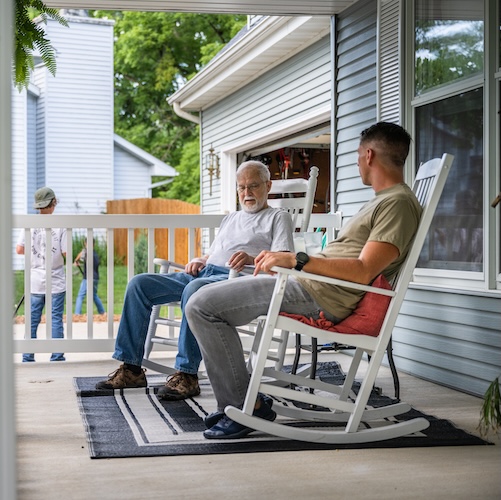What are real estate property rights, and why do they matter?
Contributed by Tom McLean
Sep 22, 2025
•7-minute read

When you buy a home, you get more than a piece of land and a structure. You also get property rights, which define what you can and can’t do with your new home. Do you need to be a property law expert to understand it all? Of course not, but it’s a good idea to understand the basics before you buy.
Key takeaways:
- Under the “bundle of rights” theory, you can compare ownership of real property to a bundle of sticks. Each “stick” represents a separate right, such as use, sell, lease, enter, or give it away.
- Note that rights can be limited or separated, such as mineral or air rights.
- Check deeds, title reports, and local regulations to confirm your understanding of your property rights before you buy a home.
What are property rights in real estate?
Property rights in the context of real estate establish how the owner can use, control, and transfer a property. The real estate world refers to the rights of a property as a “bundle of rights,” which comprises the five core rights of property ownership: possession, control, exclusion, enjoyment, and disposition.
Right of possession
The right of possession is a foundational property right. Whoever holds legal title to a property has the right to occupy, use, and control it. If you buy a home, your name is on the house title and you have the right of possession. As a homeowner, you receive the right of possession at closing, and it’s protected by law unless your property is foreclosed on or seized under specific legal conditions.
Right of control
The right of control is the owner’s legal right to use the property as they see fit. This means you can remodel, rent out your home, plant a garden in the yard, or start a home business. This right is limited by law, including zoning ordinances and homeowners association rules.
Right of exclusion
The right of exclusion allows you to decide who can enter and use your property and who cannot. This is limited by legal requirements requiring you to grant access to utility workers with easements, law enforcement personnel with warrants, and others who have legal access. For example, you can build a fence to restrict people from entering your property, but you can’t keep a utility company from servicing power lines that cross it.
Right of enjoyment
The right of enjoyment means you can use your property as you wish, as long as you don’t violate the law or infringe on your neighbors’ rights. For example, you can have as many guests as you like, or use the backyard for recreation. However, excessive noise, illegal activities such as dumping waste on the property, or HOA violations may limit this right.
Right of disposition
The right of disposition is the ability to sell, transfer, lease, or will the property to someone else. The right of disposition gives homeowners the legal ability to refinance, sell their home, or leave it to heirs. This right may be limited by a lien, which is a legal claim a creditor, such as a mortgage lender, makes against a property to ensure repayment of the debt.
Why property rights matter when buying a home
Property rights explain what you can and cannot do with your home, so it’s important to understand those limits. For example, you’ll want to know your property rights if you decide to:
- Build a shed
- Install a fence
- Rent out your basement
- Build an addition to your home
- Develop a property
- Drill for natural resources
Check with your local municipal planning or building department, your HOA, etc., for information specific to your home’s location.
Types of property rights
Let’s look at several types of property owners rights to understand, including surface rights, mineral rights, air rights, water rights, easements, and right-of-way.
Surface rights
Surface rights grant the property owner the legal authority to use the land’s surface. This includes physical structures, such as buildings, landscaping, driveways, and other visible structures.
Surface rights can be separated from other rights, like mineral rights. You may own what’s on the surface of a property, but not necessarily what’s underground or above the roofline. For example, if an oil and gas company owns the rights to your property below a certain depth, they may be able to drill on your land for minerals.
You can check with your title company or attorney to learn more about your surface rights and whether they’re separate from other rights.
Mineral rights
Mineral rights involve the legal authority to extract or profit from underground resources, such as oil, natural gas, coal, or precious metals. In some areas, especially rural or resource-rich states, mineral rights may have been sold off long before a homeowner purchases the property.
In addition to being severed from surface rights, mineral rights can be leased or sold separately. For example, an entity with mineral rights, such as the government, may legally extract oil beneath someone else’s land.
Air rights
Air rights are the right to use or develop the space above a property’s surface. They can be limited by local height restrictions or zoning laws. They often are relevant in urban areas, especially for high-rise buildings, rooftop additions, or developments with view protection. For example, developers in New York City often buy unused air rights from neighboring buildings to build higher structures. You’ll want to understand your rights should you wish to build upward or want to protect your view when purchasing a home.
Water rights
Water rights determine whether and how the owner can access water sources on or near the property, such as wells, rivers, lakes, or irrigation channels. Rules vary widely by state, especially in the West, where water rights are often prioritized and regulated.
There are two types of water rights.
- Riparian rights: Riparian rights limit water usage to landowners with riverfront land or landowners who own land adjacent to water. The landowner must make reasonable use of the water as long as it doesn’t affect a downstream landowner. They can use it for various natural purposes, including drinking water, livestock, and garden watering.
- Appropriative rights: The prior appropriation doctrine goes back to miners who settled the West. The first user has the right to use the water to the exclusion of the rights of those who come later, for specific uses like farming or irrigation. Those with appropriative rights don’t have to watch their water usage and can use it as they see fit.
In other words, owning a property by a lake doesn’t guarantee the legal right to pump or divert water from it, so check your local laws or ask a real estate attorney if you can access water on your property.
Easements and right-of-way
Easements grant someone other than the owner the right to use a portion of the property for a specific purpose without owning it. For example, a utility company may have permanent access to repair buried cables across the property you own.
Easements are common. Your property may include private easements, like a neighbor’s driveway crossing your land, and public easements, like utility lines or sidewalks.
A right-of-way is a specific easement that allows others to pass through your land, such as via shared roads or alleys.
When buying a home, review the title report for details on any existing easements and what they allow or restrict.
What limits your property rights?
You already know you may face certain legal and practical restrictions on property rights, but what entities usually maintain them?
- Local zoning laws: Local zoning laws are municipal ordinances that outline uses and control land use and building. For example, they might limit structures to a certain height, restrict noise, or regulate parking and signs.
- HOA or deed restrictions: Community associations impose deed restrictions, or rules and regulations, to maintain a particular standard of living. They promote uniformity and create cohesive community standards.
- Easements and utility access: Easements inform you how others might legally use your land. Different types of easements may be in play on your property, including: a utility company’s access to your land to work on it, a private easement to give someone else access to your property, easements by necessity (such as when your neighbor has to cross your property to get to their own, for example), and a prescriptive easement (a property right granted to someone who doesn’t own property they access).
- Eminent domain and government rights: In an eminent domain situation, the government can claim private property for public use. For example, if your city government decides to build an airstrip where a current neighborhood sits, it can take possession of the land and provide just compensation to the owners.
How to find out what rights come with a property
To determine what property rights are included when you buy a home, look at the title report, property deed, local zoning ordinances, and talk to a title company or real estate attorney. Ask specific questions about the property you’re buying, particularly if you’re curious about easements or other properties.
FAQ
Here are answers to common questions about property rights.
Can someone else have rights to my property?
Yes, other individuals or entities may have partial legal rights to a property, even if you own it. This can include utility easements, mineral rights, or right-of-way access for neighbors. These situations are common and typically disclosed in the title report.
Can I sell or lease part of my property rights?
Yes, in many cases, property rights can be subdivided and sold or leased individually. This is common with mineral rights, air rights, and rental rights. For example, a homeowner may lease mineral rights to an energy company or rent out the house while retaining ownership. These transactions may have tax or legal implications, so it’s a good idea to obtain professional guidance.
What happens to my property rights if I rent out my home?
When a homeowner rents out their property, they retain ownership, but some rights transfer to the tenant for the duration of the lease, particularly the right of possession and enjoyment. Landlords should understand their legal responsibilities and review state-specific landlord-tenant laws before they decide to rent out a home they own.
The bottom line: Know what you own and what you don’t
Knowing as much as you can about what you own and what you don’t is essential to your homeownership journey. Property rights aren’t always obvious and can be limited or divided, but that isn’t always a bad thing. Ask questions during the buying process and work with professionals to fully understand your ownership rights so you can move forward with confidence.
If you’re ready to buy a piece of property, get started with Rocket Mortgage® today.

Melissa Brock
Melissa Brock is a freelance writer and editor who writes about higher education, trading, investing, personal finance, cryptocurrency, mortgages and insurance. Melissa also writes SEO-driven blog copy for independent educational consultants and runs her website, College Money Tips, to help families navigate the college journey. She spent 12 years in the admission office at her alma mater.
Related resources

6-minute read
A complete guide to property tax benefits for veterans
Do veterans pay property taxes? It depends on where you live and your disability status. Learn more with the Rocket Mortgage guide.
Read more

5-minute read
What is home appreciation and how is it calculated?
Learn how the value of your home or investment property may be increasing over time, resulting in equity while you own it and profits when you sell it.
Read more

7-minute read
How much does it cost to renovate a house?
The amount it costs to remodel a house can vary depending on the scale of the project. Learn the average costs associated with various kinds of remodels.
Read more